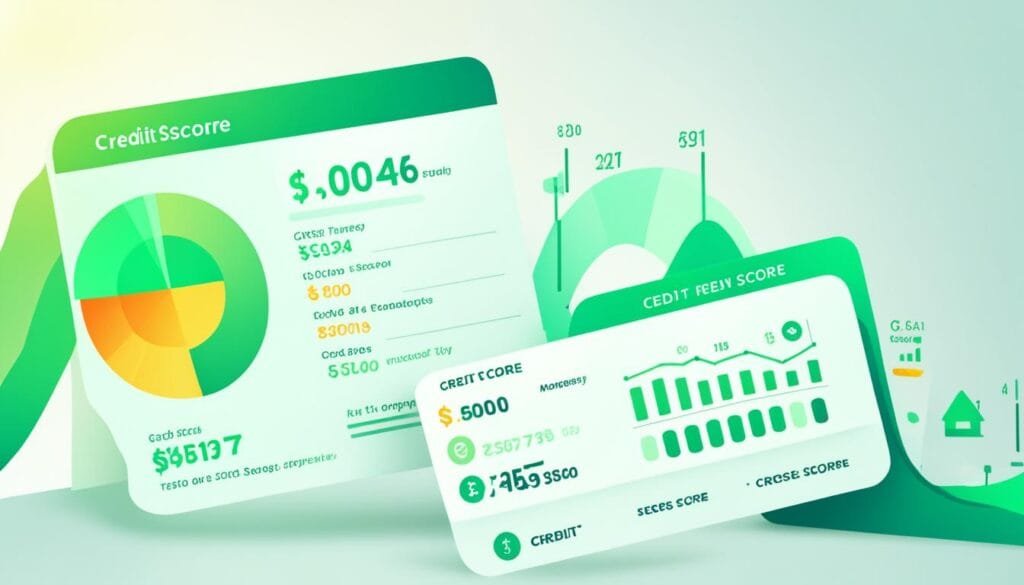When it comes to borrowing money, your credit score plays a crucial role in determining your eligibility and borrowing power. Lenders rely heavily on this three-digit number to assess your creditworthiness and make informed decisions about loan approvals, interest rates, and loan amounts.
Your credit score is a reflection of your financial reputation and is influenced by various factors, including your repayment history, credit utilization, and credit inquiries. A higher credit score indicates to lenders that you are a responsible borrower and poses a lower risk, which can increase your borrowing power and open doors to better loan options.
Understanding the impact of credit scores on loans is essential for anyone seeking to secure financing for personal or business needs. This article will delve into the importance of credit scores, how they affect loan approvals, and steps you can take to improve your creditworthiness.
Key Takeaways:
- Your credit score plays a significant role in your borrowing power and loan eligibility.
- Lenders use your credit score to assess your creditworthiness and make decisions about loan approvals.
- Factors such as repayment history, credit utilization, and credit inquiries affect your credit score.
- A higher credit score increases your chances of getting approved for loans with better terms and conditions.
- You can improve your credit score by making timely payments, reducing credit card balances, and managing debt responsibly.
Understanding Credit Scores and Their Importance
A credit score, also known as a credit rating, is a numerical representation of your creditworthiness. It is calculated based on various factors, including payment history, credit utilization, length of credit history, types of credit, and new credit inquiries. Lenders use this score to assess your ability to repay a loan.
To improve your credit score, focus on making timely payments, reducing credit card balances, and avoiding excessive debt. Regularly monitoring your credit report can help you identify areas for improvement.
Understanding the key factors that influence your credit score is essential in managing and improving your creditworthiness. Let’s take a closer look at these factors:
| Factors | Description |
|---|---|
| Payment History | The record of your past payment performance, including any late payments or defaults. |
| Credit Utilization | The amount of credit you are currently using compared to your total credit limit. |
| Length of Credit History | The length of time you have been using credit, including the age of your oldest and newest accounts. |
| Types of Credit | The variety of credit accounts you have, such as credit cards, loans, and mortgages. |
| New Credit Inquiries | The number of recent credit inquiries, which may indicate a higher risk of taking on additional debt. |
Improving your credit score takes time and effort. By establishing good credit habits and being responsible with your borrowing and repayment, you can enhance your creditworthiness and open up better financial opportunities.
Remember, your credit score is not set in stone. It can change over time based on your financial behaviors and choices. Keep track of your credit score and take proactive steps to improve your creditworthiness.
Regularly reviewing your credit report can give you valuable insights into your financial health and help you maintain an accurate credit history. It is also important to be aware of common credit score myths and consult trusted sources for guidance.
In the next section, we will explore the impact of credit scores on loan approval and the available loan options based on your creditworthiness.
The Impact of Credit Scores on Loan Approval
Your credit score plays a crucial role in the loan approval process. Lenders use it to evaluate your creditworthiness and determine the interest rate and loan amount you qualify for. A higher credit score increases your chances of getting approved for a loan and securing more favorable loan terms.
When it comes to loan options, personal loans and business loans are popular choices. Your credit score can significantly impact your eligibility for these types of loans. Let’s take a closer look at how your credit score affects loan approval:
Personal Loans
Personal loans are unsecured loans that can be used for a variety of purposes, such as debt consolidation, home improvement, or unexpected expenses. Lenders assess your credit score to determine your repayment history and ability to manage debt responsibly.
With a higher credit score, you not only have a better chance of being approved for a personal loan, but you may also qualify for lower interest rates. This means you can save money over the life of the loan, making it more affordable and manageable.
Business Loans
For entrepreneurs and small business owners, business loans can provide the necessary funds to start or expand a business. When applying for a business loan, lenders consider your personal credit score as well as your business’s credit history.
A strong personal credit score demonstrates your financial responsibility and can improve your chances of obtaining a business loan. It indicates to lenders that you are reliable and capable of managing debt, which gives them confidence in your ability to repay the loan.
Here is an example of how credit score ranges can affect loan approval:
| Credit Score Range | Loan Approval Rate |
|---|---|
| Excellent (740-850) | High |
| Good (670-739) | Moderate |
| Fair (580-669) | Low |
| Poor (300-579) | Very low |
As you can see, maintaining a good credit score can significantly impact your loan approval rate. It’s important to take steps to improve your credit score or maintain a high score by making timely payments and managing your credit responsibly.
Next, we will explore the different types of credit inquiries and their impact on your credit score and loan applications. Understanding these inquiries can help you navigate the loan application process more effectively.

Credit Scores and Loan Applications
When applying for a loan, the lender will assess your creditworthiness through a credit inquiry. Credit inquiries come in two types: hard and soft. Understanding the difference between the two can help you navigate the loan application process more effectively.
Hard Credit Inquiry
A hard credit inquiry occurs when you submit a loan application or apply for a credit card. During a hard inquiry, the lender accesses your credit report to evaluate your credit history and determine your eligibility for the loan. It is important to note that a hard credit inquiry is recorded on your credit file and can temporarily lower your credit score.
Soft Credit Inquiry
In contrast to a hard inquiry, a soft credit inquiry does not impact your credit score. Soft inquiries occur when background checks are conducted by employers, or when you check your own credit report. These inquiries do not affect your creditworthiness or loan eligibility. It’s important to be aware that only hard credit inquiries have an impact on your credit score.
Multiple hard credit inquiries within a short period can suggest financial instability and may lower your chances of loan approval. Lenders view multiple inquiries as a sign that you are actively seeking credit and may be taking on more debt than you can handle. Therefore, it is generally advisable to limit the number of hard inquiries, as they can have a negative impact on your creditworthiness.
Pre-approval is another option to consider, as it allows you to gauge your eligibility for a loan without undergoing a hard credit inquiry. Pre-approval typically involves a soft credit check, which gives you an estimate of the loan amount you may qualify for. This way, you can explore different loan options and decide which ones align with your financial goals before committing to a formal loan application.

By being aware of the distinction between hard and soft credit inquiries and understanding their impact on your credit score and loan applications, you can make informed choices that help maintain and improve your creditworthiness.
Improving Your Credit Score for Better Loan Options
To improve your credit score and increase your chances of obtaining better loan options, it’s crucial to focus on key factors that contribute to a higher score. By implementing a few strategic actions, you can enhance your creditworthiness and unlock more favorable loan terms.
1. Make Timely Payments
One of the most important factors in improving your credit score is consistently making timely payments on all your credit accounts. Payment history accounts for a significant portion of your credit score, so paying your bills on time demonstrates responsible financial behavior and builds trust with lenders.
2. Avoid Maxing Out Credit Cards
It’s important to keep your credit card balances low and avoid maxing out your cards. This helps to lower your credit utilization ratio, which is the amount of credit you’ve used compared to your total available credit. High credit utilization can negatively impact your credit score, so strive to keep it below 30%.
3. Limit Applications for New Credit
Applying for multiple new credit accounts within a short period can be perceived as a red flag by lenders. Each application results in a hard credit inquiry, which temporarily lowers your credit score. To maintain a positive credit score, limit new credit applications unless absolutely necessary.
4. Reduce Outstanding Debt
Paying down your outstanding debt can have a positive impact on your credit score. Focus on reducing the balances on your credit cards and other outstanding loans. By gradually lowering your debt, you’ll improve your credit utilization ratio and demonstrate responsible debt management.
Understanding the Credit Score Range
It’s important to have a clear understanding of the credit score range and where your score falls within that range. Credit scores typically range from 300 to 850, with higher scores indicating lower credit risk. Aim to achieve a credit score in the higher range to improve your eligibility for better loan options and more favorable terms.
| Credit Score Range | Credit Rating |
|---|---|
| 300-579 | Poor |
| 580-669 | Fair |
| 670-739 | Good |
| 740-799 | Very Good |
| 800-850 | Excellent |
By consistently implementing these strategies and making improvements to your credit score, you’ll position yourself for better loan options and more favorable terms. Keep in mind that improving your credit score takes time and discipline, so be patient and stay committed to building a strong credit profile.
Next, in section 6, we’ll explore how to obtain and review your credit report to ensure its accuracy and address any potential discrepancies.
Obtaining and Reviewing Your Credit Report
Regularly reviewing your credit report is crucial to ensure its accuracy and identify any errors or discrepancies that may negatively impact your credit score. By obtaining a free copy of your credit report from each of the three major credit bureaus once a year, you can stay informed about your credit history and take necessary steps to maintain a healthy financial profile.
Your credit report contains vital information about your creditworthiness, including details about your credit card balances, late payments, and collections. It provides insights into your financial habits and helps lenders assess your creditworthiness when considering loan applications.
To obtain your credit report, you can visit the websites of the three major credit bureaus: Equifax, Experian, and TransUnion. These bureaus are responsible for collecting and maintaining credit information for individuals and businesses in the United States. Each bureau may have slightly different information in your report, so it’s important to review all three to get a comprehensive view of your credit history.
Understanding your FICO score is essential in evaluating your creditworthiness. FICO scores are commonly used credit scoring models that provide lenders with an overview of your credit risk. This score takes into account factors such as payment history, credit utilization, length of credit history, types of credit used, and new credit applications.
Take the time to examine your credit report carefully, ensuring that all information is accurate and up-to-date. If you discover any errors or discrepancies, you have the right to dispute them with the credit bureaus. Promptly addressing any inaccuracies can help protect your credit score and maintain a positive credit history.
| Credit Bureau | Website |
|---|---|
| Equifax | www.equifax.com |
| Experian | www.experian.com |
| TransUnion | www.transunion.com |
– How Does Credit Score Impact Borrowing Power for Car Financing?
When it comes to car financing with credit score, your credit score plays a crucial role in determining your borrowing power. A higher credit score can help you qualify for lower interest rates and higher loan amounts, while a lower credit score can result in higher interest rates and more limited borrowing options.
Conclusion
Your credit score plays a crucial role in your borrowing power and loan eligibility. It determines whether lenders will approve your loan application and affects the terms and conditions you receive. Therefore, maintaining a good credit score is essential for accessing favorable loan options.
To improve your credit score, focus on understanding the factors that influence it. Make timely payments on all your credit accounts, keep your credit card balances low, and avoid unnecessary credit inquiries. By taking these steps, you can enhance your financial opportunities and increase your chances of loan approval.
Regularly monitoring your credit report is also important. It allows you to identify any errors or discrepancies that may be negatively impacting your credit score. Seeking professional guidance can provide valuable insights and help you make informed decisions to strengthen your creditworthiness.
In conclusion, by maintaining a good credit score, understanding the factors that influence it, and taking proactive steps to improve it, you can maximize your borrowing power and secure the best loan options with favorable terms and conditions.
FAQ
What is a credit score?
A credit score is a number used by lenders to assess the trustworthiness of borrowers. It determines whether you’ll be approved for a loan, how much money you can borrow, and the terms and conditions of the loan.
How is a credit score calculated?
A credit score, also known as a credit rating, is calculated based on various factors, including payment history, credit utilization, length of credit history, types of credit, and new credit inquiries.
How does a credit score impact loan approval?
Your credit score plays a crucial role in the loan approval process. A higher credit score increases your chances of getting approved for a loan and securing more favorable loan terms.
What is the difference between a hard and soft credit inquiry?
A hard credit inquiry, such as a loan application or credit card application, is recorded on your credit file and can temporarily lower your credit score. In contrast, a soft credit inquiry, such as a background check by an employer, doesn’t impact your credit score.
How can I improve my credit score?
To improve your credit score, focus on making timely payments, reducing credit card balances, and avoiding excessive debt. Lowering your credit utilization ratio and reducing outstanding debt can also positively impact your credit score.
How can I obtain and review my credit report?
You can obtain a free copy of your credit report once a year from each of the three major credit bureaus. Your credit report contains information about your credit history, including credit card balances, late payments, and collections. Understanding your FICO score, a common credit scoring model, can help you evaluate your creditworthiness and take steps to improve your score.

